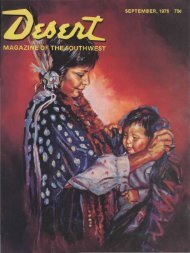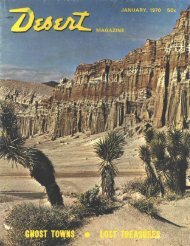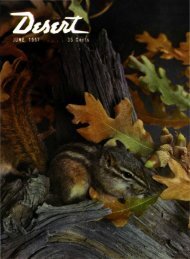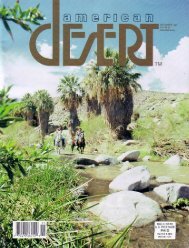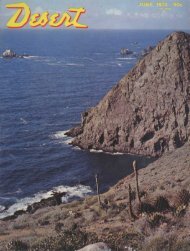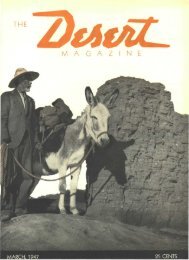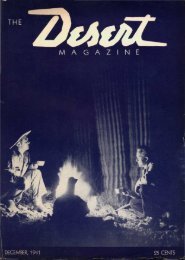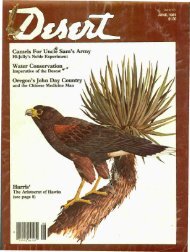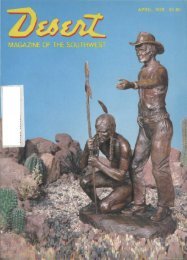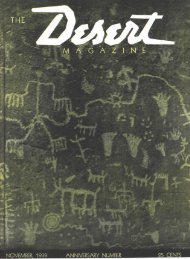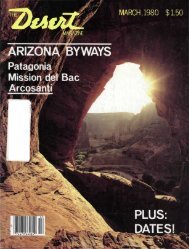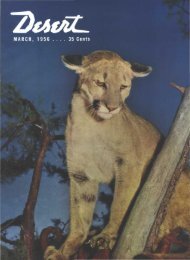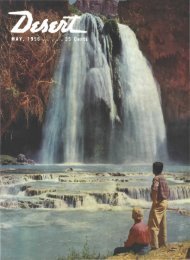Desert Magazine Book Shop - Desert Magazine of the Southwest
Desert Magazine Book Shop - Desert Magazine of the Southwest
Desert Magazine Book Shop - Desert Magazine of the Southwest
Create successful ePaper yourself
Turn your PDF publications into a flip-book with our unique Google optimized e-Paper software.
structed houses for <strong>the</strong> Aleutians; shops<br />
for <strong>the</strong> blacksmith, carpenter, and cooper;<br />
a tannery, bakery, and flour mill. On <strong>the</strong><br />
beach at <strong>the</strong> bottom <strong>of</strong> <strong>the</strong> cliff, <strong>the</strong>y<br />
built a pier, blacksmith shops and sheds<br />
to be used in boat building and storing<br />
<strong>the</strong> baidarkas (skin boats) and lumber.<br />
In August <strong>of</strong> 1812, "Colony Ross"<br />
was dedicated and Ivan Kuskov became<br />
<strong>the</strong> first company manager. A party <strong>of</strong><br />
95 Russians and 80 Aleutians settled<br />
down to <strong>the</strong> business <strong>of</strong> hunting furs and<br />
raising wheat.<br />
While <strong>the</strong> native Indians worked as<br />
servants and laborers, <strong>the</strong> Aleutians did<br />
<strong>the</strong> hunting. And hunting was good <strong>the</strong><br />
first few years. In <strong>the</strong>ir baidarkas, <strong>the</strong>y<br />
sailed hundreds <strong>of</strong> miles in good wea<strong>the</strong>r<br />
or bad. A baidarka was made <strong>of</strong> seal or<br />
sea lion skins sewed toge<strong>the</strong>r and stretched<br />
over a light wood frame; <strong>the</strong>n oiled<br />
to make it waterpro<strong>of</strong>. The Aleuts attached<br />
<strong>the</strong>ir skin clothing to <strong>the</strong> boat to<br />
keep out <strong>of</strong> <strong>the</strong> water. They hunted <strong>of</strong>f<br />
<strong>the</strong> coast from Cape Mendocino to <strong>the</strong><br />
Farallones Islands; <strong>the</strong>n as far south as<br />
Baja. Thousands <strong>of</strong> animals were killed<br />
and <strong>the</strong> pelts stored at Ross until shipped<br />
to markets in China and Europe.<br />
In an effort to discourage <strong>the</strong> hunters,<br />
<strong>the</strong> Spaniards sent out armed patrols<br />
who would wait for <strong>the</strong>m to land for<br />
water and dry and oil <strong>the</strong>ir boats; <strong>the</strong>n<br />
<strong>the</strong>y would shoot and ei<strong>the</strong>r frighten <strong>the</strong><br />
hunters <strong>of</strong>f—wounding and killing some<br />
—or capture <strong>the</strong>m—to languish in a<br />
prison for months. Later, <strong>the</strong> Mexican<br />
government tried to control <strong>the</strong> slaughter<br />
by granting seasonal hunting permits.<br />
Trade was important to Fort Ross.<br />
They sold articles <strong>of</strong> lea<strong>the</strong>r, wood, and<br />
iron <strong>the</strong>y made and goods <strong>the</strong>y imported,<br />
such as silks, tools, and utensils, to <strong>the</strong><br />
Californians who needed <strong>the</strong>m because<br />
<strong>of</strong> <strong>the</strong> forengn trade ban and slow supply<br />
ships. Food was also supplied to ships<br />
that stopped at Bodega.<br />
No formal permission to trade had<br />
been given to <strong>the</strong> Russians. It was all un<strong>of</strong>ficial.<br />
And whe<strong>the</strong>r a governor blew<br />
warm or cool toward <strong>the</strong> "trespassers,"<br />
trading continued.<br />
And so it went. The Spaniards kept<br />
asking <strong>the</strong>m to leave; <strong>the</strong> Russians kept<br />
stating <strong>the</strong>y were waiting to hear from<br />
<strong>the</strong>ir superior. But both <strong>of</strong> <strong>the</strong>m knew—<br />
that in spite <strong>of</strong> <strong>the</strong> Viceroy's order—<strong>the</strong><br />
Spanish garrison was too small to force<br />
<strong>the</strong>m to go. Uninvited and unwanted <strong>the</strong>y<br />
stayed.<br />
By <strong>the</strong> 1830s, only a few hundred pelts<br />
were being taken where years before<br />
thousands were. The hunters had done<br />
<strong>the</strong>ir job too well. The farming had problems<br />
too. The yield from <strong>the</strong> crops was<br />
not enough; <strong>the</strong>re was a lack <strong>of</strong> trained<br />
farm workers; and more land was needed.<br />
However, most <strong>of</strong> <strong>the</strong> land had been<br />
Built about 1825, <strong>the</strong> chapel at Fort Ross was called Trinity Church. The former<br />
Russian stronghold is now a historical monument on U.S. 1 in Sonoma County.<br />
settled and no one wanted to sell. The<br />
Mexican government would though—for<br />
a price. Czar Nicholas would have to<br />
recognize <strong>the</strong> independence <strong>of</strong> Mexico.<br />
The price was too high.<br />
Because Ross was nei<strong>the</strong>r producing<br />
enough furs or food for Alaska now, <strong>the</strong><br />
Russian-American Company considered<br />
selling <strong>the</strong> outpost. But Alaska needed<br />
<strong>the</strong> food. An agreement with <strong>the</strong> Hudson<br />
Bay Company to regularly supply<br />
food to <strong>the</strong> nor<strong>the</strong>rn colony solved <strong>the</strong><br />
problem. The fort was ordered sold.<br />
The Californians viewed <strong>the</strong> sale quite<br />
differently. No formal permission had<br />
been given <strong>the</strong> Russians to settle <strong>the</strong> land<br />
and since <strong>the</strong> buildings were made from<br />
trees that grew on <strong>the</strong> land, <strong>the</strong> Company<br />
owned nei<strong>the</strong>r <strong>the</strong> land nor <strong>the</strong><br />
buildings. The property would revert to<br />
<strong>the</strong> Spaniards when <strong>the</strong> Russians left.<br />
The Company's answer was <strong>the</strong> Indians<br />
ceded <strong>the</strong> land and it could be sold. Ross<br />
was <strong>of</strong>fered to <strong>the</strong> Hudson Bay Company,<br />
headed by General Vallejo <strong>of</strong> Sonoma,<br />
and Captain John Sutter <strong>of</strong> New Helvetia.<br />
The price was $30,000; one half<br />
in drafts on <strong>the</strong> Hudson Bay Company<br />
and <strong>the</strong> rest in produce <strong>of</strong> <strong>the</strong> country.<br />
The discussions went on and on.<br />
Finally, Sutter bought <strong>the</strong> Ross and<br />
Bodega properties including livestock,<br />
arms, equipment and buildings. After 30<br />
years in California, <strong>the</strong> Russians left.<br />
The property changed hands several<br />
times and in 1906 <strong>the</strong> California Historical<br />
Landmarks Committee <strong>of</strong> San Francisco<br />
bought <strong>the</strong> fort and presented it to<br />
<strong>the</strong> state. Today, <strong>the</strong> state historic park<br />
consists <strong>of</strong> 356 acres with <strong>the</strong> fort sitting<br />
squarely across Highway 1 in Sonoma<br />
County with <strong>the</strong> road passing through<br />
two openings in <strong>the</strong> stockade.<br />
The buildings — <strong>the</strong> chapel, blockhouses,<br />
and manager's house have been<br />
au<strong>the</strong>ntically restored and furnished. The<br />
manager's house is a museum where<br />
among articles on display is a silver Samovar.<br />
Russian folk music (recordings)<br />
are heard. There is a small fee. The buildings<br />
are open 8 to 5 daily (<strong>the</strong> museum<br />
10 to 5 weekdays.) Summer hours are<br />
8 to 6.<br />
If you visit Fort Ross and <strong>the</strong> fog lies<br />
thick upon <strong>the</strong> hills and it is quiet except<br />
for <strong>the</strong> roar <strong>of</strong> <strong>the</strong> surf, it's not hard<br />
to imagine heavily loaded figures appearing<br />
out <strong>of</strong> <strong>the</strong> mist, <strong>the</strong> shouting <strong>of</strong> orders<br />
in Russian, and <strong>the</strong> answering cry. •<br />
21



